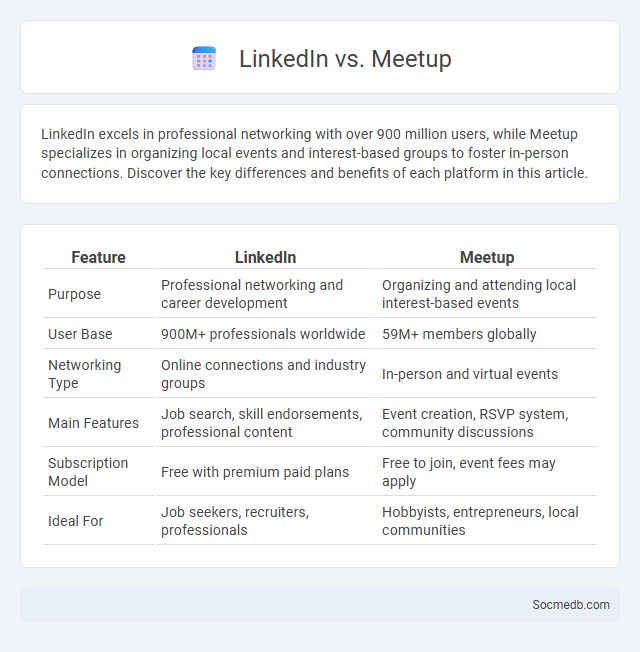
Photo illustration: LinkedIn vs Meetup
LinkedIn excels in professional networking with over 900 million users, while Meetup specializes in organizing local events and interest-based groups to foster in-person connections. Discover the key differences and benefits of each platform in this article.
Table of Comparison
| Feature | Meetup | |
|---|---|---|
| Purpose | Professional networking and career development | Organizing and attending local interest-based events |
| User Base | 900M+ professionals worldwide | 59M+ members globally |
| Networking Type | Online connections and industry groups | In-person and virtual events |
| Main Features | Job search, skill endorsements, professional content | Event creation, RSVP system, community discussions |
| Subscription Model | Free with premium paid plans | Free to join, event fees may apply |
| Ideal For | Job seekers, recruiters, professionals | Hobbyists, entrepreneurs, local communities |
Introduction to Professional Networking Platforms
Professional networking platforms like LinkedIn and Xing provide targeted environments for building business connections and enhancing career opportunities. These platforms enable users to showcase their skills, share industry insights, and engage with relevant professional communities. Leveraging optimized profiles and active participation increases visibility and fosters meaningful relationships in competitive job markets.
Overview of LinkedIn
LinkedIn is the leading professional networking platform with over 900 million members worldwide, designed to connect professionals, recruiters, and businesses. Your profile serves as a digital resume, showcasing your skills, experience, and endorsements to potential employers or collaborators. The platform offers advanced job search tools, industry news, and opportunities for professional development to enhance career growth.
Overview of Meetup
Meetup is a social media platform designed to connect people with shared interests through in-person and virtual events, fostering community building and networking opportunities. Your ability to join or create groups based on hobbies, professional development, or local activities makes it a versatile tool for expanding social circles and engaging with like-minded individuals. This platform leverages location-based algorithms to recommend events and groups, enhancing your chances of meaningful interactions in a diverse range of fields.
What Are Professional Networks?
Professional networks are online platforms designed to connect individuals within specific industries, facilitating career development, knowledge sharing, and business opportunities. Key professional networks like LinkedIn enable users to create detailed profiles, showcase skills, and cultivate relationships with colleagues, recruiters, and potential clients. These networks play a crucial role in job searching, industry insights, and building a personalized brand in the digital economy.
Key Features Comparison: LinkedIn vs Meetup vs Professional Networks
LinkedIn offers robust professional networking tools, job listings, and industry-specific content, making it ideal for career development and business connections. Meetup emphasizes local event organization and community building, allowing You to engage in face-to-face networking and interest-based groups. Other professional networks combine niche industry focus with tailored communication features, but lack the widespread reach and job market integration found on LinkedIn.
Audience and Community Differences
Understanding the differences between social media audiences and communities is crucial for effective engagement. Your audience consists of followers or viewers who passively consume content, while a community is an active group of individuals who interact, support, and engage with each other and your brand. Building a strong community fosters loyalty and deeper connections compared to simply growing an audience.
Event and Networking Opportunities
Social media platforms like LinkedIn, Facebook, and Twitter provide abundant event and networking opportunities that connect professionals globally. You can discover industry conferences, webinars, and meetups tailored to your interests, enhancing your professional growth and expanding your network. Engaging actively on these platforms boosts your visibility, making it easier to build meaningful connections and access career-advancing events.
Branding and Profile Building
Effective branding on social media platforms drives consistent visual identity and messaging that resonates with target audiences, enhancing brand recognition and loyalty. Crafting a compelling profile involves optimizing bio sections with relevant keywords, a professional profile image, and clear calls to action that direct visitors toward engagement or conversion. Leveraging analytics tools to monitor audience behavior and adjust content strategies strengthens profile visibility and drives sustained growth.
Effectiveness for Career Growth
Social media platforms like LinkedIn, Twitter, and Instagram significantly enhance career growth by facilitating professional networking, industry insights, and personal branding. Research shows that 70% of recruiters use social media to find potential candidates, highlighting its role in job opportunities and skill showcasing. Regular engagement and strategic content sharing on these platforms can accelerate career advancement and increase visibility in competitive job markets.
Choosing the Right Platform for Your Needs
Selecting the ideal social media platform depends on your target audience, content type, and marketing goals. Platforms like Instagram and TikTok excel for visual and short-form video content targeting younger demographics, while LinkedIn suits B2B networking and professional engagement. Analyzing user demographics and engagement metrics helps optimize reach and maximize return on investment.
 socmedb.com
socmedb.com